In early June, my lockdown-enforced frustration lifted somewhat when my friend sent me an Instagram post by A New World in Our Hearts (@iohnyc), the NYC-based anarchist collective. The picture was of a community fridge, one of what would become a 30+ strong network of fridges offering free food across the city. In the hopes of starting one in Washington Heights, my friend and I connected with around 15 other volunteers in the area through WhatsApp. We eventually secured a donated fridge and a host to lend us an outlet, Cafeteria Serie 57, a deli run by Tony Alvarez, and the Uptown Fridge (@theuptownfridge) was born. Like its predecessors, the fridge had a dual mission: to reduce food waste by rescuing excess food and to help those dealing with food insecurity.
“The fridge had a dual mission: to reduce food waste by rescuing excess food and to help out those dealing with food insecurity.”
New York City was a hotbed for Covid-19, and within a couple months of the first outbreak it had taken thousands of residents’ lives. I spent a lot of time sitting at home in Washington Heights, in northern Manhattan, reading one grim news story after another. I learned that the experience of the pandemic differed largely based on race and class: while many middle and upper-income people were able to stay comfortable and safe at home, a predominantly non-white, low-income segment of the population risked infection at “essential” jobs or tried to survive on a paltry government stimulus check. These vastly different experiences also showed up in food. My social media feeds were flooded with images of attempted sourdough creations and elaborate dishes, but I also saw posts asking to donate to someone’s Venmo so they could buy groceries.
And so, our fridge had a radical vision. Unlike government-run or non-profit aid programs, it doesn’t demand anything from the people it serves. There is no form to fill out before you can access the food, no need for ID, or hair-pulling government bureaucracy, or to prove that you’re “deserving” of aid. All you need to do is open the door and take what you want. This is not just for convenience’s sake, but a fundamental principle of mutual aid; it comes from the belief that people should not have to beg for basic necessities. As one of the organizers, Aditi Varshneya, eloquently stated in an interview: “We don’t see people’s poverty as an individual problem; it’s a societal problem, because we live in a society… that benefits some at the expense of the many.” Put another way, a third of Washington Heights’ residents are food-insecure, yet the city has over 110 billionaires. Evidently, the focus should be on helping as many in need as possible, not trying to determine if one struggling person is slightly better off than another.
It’s not just community fridges that follow this line of thinking. Although “mutual aid” can sound like a fancy way to say “charity”, it’s actually rooted in radical organization theory. The anarchist philosopher Peter Kropotkin popularized the term in his 1902 essay collection, Mutual Aid: A Factor of Evolution , which argues that cooperation, not competition, was the driving mechanism behind evolution. In “normal” times, our relationships to one another often feels somewhat competitive, or at least transactional: worker to employee, seller to buyer. But during the pandemic, many turned to mutual aid, not businesses or government help, for survival. Grassroots initiatives popped up around the city with everything from delivering groceries to at-risk neighbors to performing wellness checks. Many more examples can be found in Jia Tolentino’s wonderful article, What Mutual Aid Can Do During a Pandemic, for The New Yorker.
Practicing mutual aid is crucial, even in the absence of a widespread disaster like that of Covid-19. Widening gaps between the rich and the poor leave so many suffering even when the economy appears to be doing well. New York City contains some of the most stark socioeconomic inequalities in the United States. Community organizations help fill the gap between what the government should be providing and what individuals and families need.
“Healthy food is not often treated as a human right, but it should be.”
Mutual aid can draw skepticism because it doesn’t align with what we’ve been taught. We’re tempted to think: won’t people take advantage of free stuff somehow? And besides, shouldn’t you earn your food like everyone else? After a video of the fridge was posted on Youtube, I read many comments along the lines of “it’s not long before the fridge gets stolen” or “just wait till someone pisses in it”. It’s a uniquely capitalist mindset that teaches us this behavioural framework. Healthy food is not often treated as a human right, but it should be.
“It’s a reminder of the fridge’s purpose, and to remember that food and community solidarity go hand in hand.”
It’s been two and a half months since the fridge was set up, and it is still standing proud, free of piss. Organizers from across the city visit daily to drop off fresh produce and shelf-stable items that would otherwise have gone to waste. Running the fridge is not always easy – there have to be regular drops so the fridge doesn’t sit empty for too long, and enough volunteers to help pick up and distribute the food, and someone needs to make sure the fridge doesn’t break down in 90 degree heat. But the organizers take pride in the work they do because they see the impact of it first-hand: people getting excited by the fresh produce and the cereal boxes, kids and mothers taking a gallon of milk that would’ve gone in the trash. On the side of the Uptown Fridge it says, in Spanish, la comunidad se cuida y se ama – the community takes care of and loves itself. It’s a reminder of the fridge’s purpose, and to remember that food and community solidarity go hand in hand.






